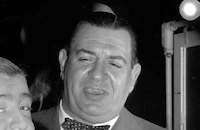The Winning Ticket

Brief Synopsis
Cast & Crew
Charles F. Riesner
Leo Carrillo
Louise Fazenda
Ted Healy
Irene Hervey
James Ellison
Film Details
Technical Specs

Synopsis
The Tomasellos are a poor Italian immigrant family who live in New York. At the urging of his brother-in-law Eddie, and against the wishes of his wife Nora, who objects to gambling, barber Joe Tomasello purchases an Irish sweepstakes ticket. While listening to the sweepstakes drawing on the radio, Eddie faints when Joe's ticket number is announced as the $150,000 first prize winner. Instead of telling Joe right away that he has won, Eddie tries to finagle a percentage of the winnings by ingratiating himself with the winner. Before he can succeed, though, Jeffries, a representative from Lloyd's Insurance Company of London, brings Joe the good news and offers to buy the winning ticket for $10,000 so that he can gamble the money on a bigger win. Joe accepts the offer, but complications arise when Eddie remembers that he gave his lawyer, Tony, the ticket to hold. Eddie plans to get the ticket from Tony, but in the meantime, spends most of Joe's money on a horseracing bet. After their horse, "Salome," wins, Joe and Eddie go to Tony's to get the ticket, but are shocked when they discover that Joe's baby, Mickey, was the last one seen with it. Desperate to find the missing ticket, Tony, Eddie and Joe try to get Mickey to show them what he did with the jar that contained the winning ticket. When the baby points to some loose flooring in the living room, they take apart the floor and dig a huge hole, but come up with nothing. Tony, who faces imprisonment for his outstanding debts, worries about the lost ticket and sees that their only solution is to go to Ireland by boat and try to convince the sweepstakes officials that Joe had purchased the winning ticket. Eddie, who is afraid of ships, is tricked onto the boat by Joe, but, along with the Tomasellos, he is ejected from the steamer when he is discovered to be a stowaway. Later, when the men see Mickey inserting a piece of paper into the mouth of a ceramic parrot, they think that it is a sign that the toddler has hidden the ticket inside one of his father's many ceramic parrot pieces. Tony, Eddie and Joe, with the help of the man who sold the remaining forty-five parrots for Joe, track down the owners of the ceramic birds. One of the owners is Mr. Powers, who, when visited by the three men, watches in disbelief as they destroy his parrot and find nothing. Tony and Joe are then jailed for their actions. When Nora, with her baby, visits them in jail, she brings Joe his guitar to help him pass the time. However, Nora and Joe soon quarrel, and when she breaks the guitar over his head, the missing ticket emerges from the broken guitar, and Joe suddenly remembers that the baby had been playing with the instrument. Having rescued themselves from their troubles, Nora, Joe and Tony go to "Salome's" stock farm and ride their winning thoroughbred.

Director

Charles F. Riesner
Cast

Leo Carrillo

Louise Fazenda

Ted Healy
Irene Hervey

James Ellison
Luis Alberni
Purnell B. Pratt

Akim Tamiroff
Betty Jane Graham
Billy Watson
Johnny Indrisano
Ronald Fitzpatrick
Frank Moran

Lee Phelps
William Stack
Montague Shaw
Jane Meredith
Larry Steers
Milton Owen
Sherry Hall
Bud Harris
Wilbur Mack
Charles Dunbar
Wally Maher
James P. Burtis
Sam Flint
Clara Blandick
George Guhl
Al Hill
Clarence Hummel Wilson
Crew
Charles [g.] Clarke
Jack Cummings
Cedric Gibbons
Robert Pirosh
Charles F. Riesner
Richard Schayer
George Seaton
Douglas Shearer
Ralph Spence
David Townsend
Edwin B. Willis
Hugh Wynn

Film Details
Technical Specs

Articles
The Winning Ticket -
By Richard Harland Smith

The Winning Ticket -
Quotes
Trivia
Notes
Although Hollywood Reporter pre-release news items and production charts credit Robert Hopkins with the original story, and list Clarence Muse, Tom McGuire, Jim Farley, Curley Wright and Robert Homans in the cast, their participation in the film has not been confirmed. Background scenes were filmed at the Saratoga racetrack in Saratoga Springs, New York.














